MC4M1 - Data Protection as a Key Factor in Digital Communication
VerifiedAdded on 2023/06/12
|23
|5024
|383
Essay
AI Summary
This essay explores the adequacy of current data protection laws in the digital age, focusing on the UK's legal framework. It discusses key legislations such as the Data Protection Act 1998, The Privacy and Electronic Communications (EC Directives) Regulations 2003, Data Retention and Investigatory Powers Act 2014 (DRIPA) and Freedom of Information Act 2000, and the General Data Protection Regulation (GDPR). The essay evaluates the strengths and weaknesses of these laws in protecting individual privacy against the backdrop of increasing digitalization, online transactions, and data breaches. It also examines the challenges posed by cross-border data flows and the role of online platforms like Facebook, YouTube, and Twitter. The conclusion reflects on the improvements in data protection laws while acknowledging that more needs to be done to fully safeguard online users' privacy.
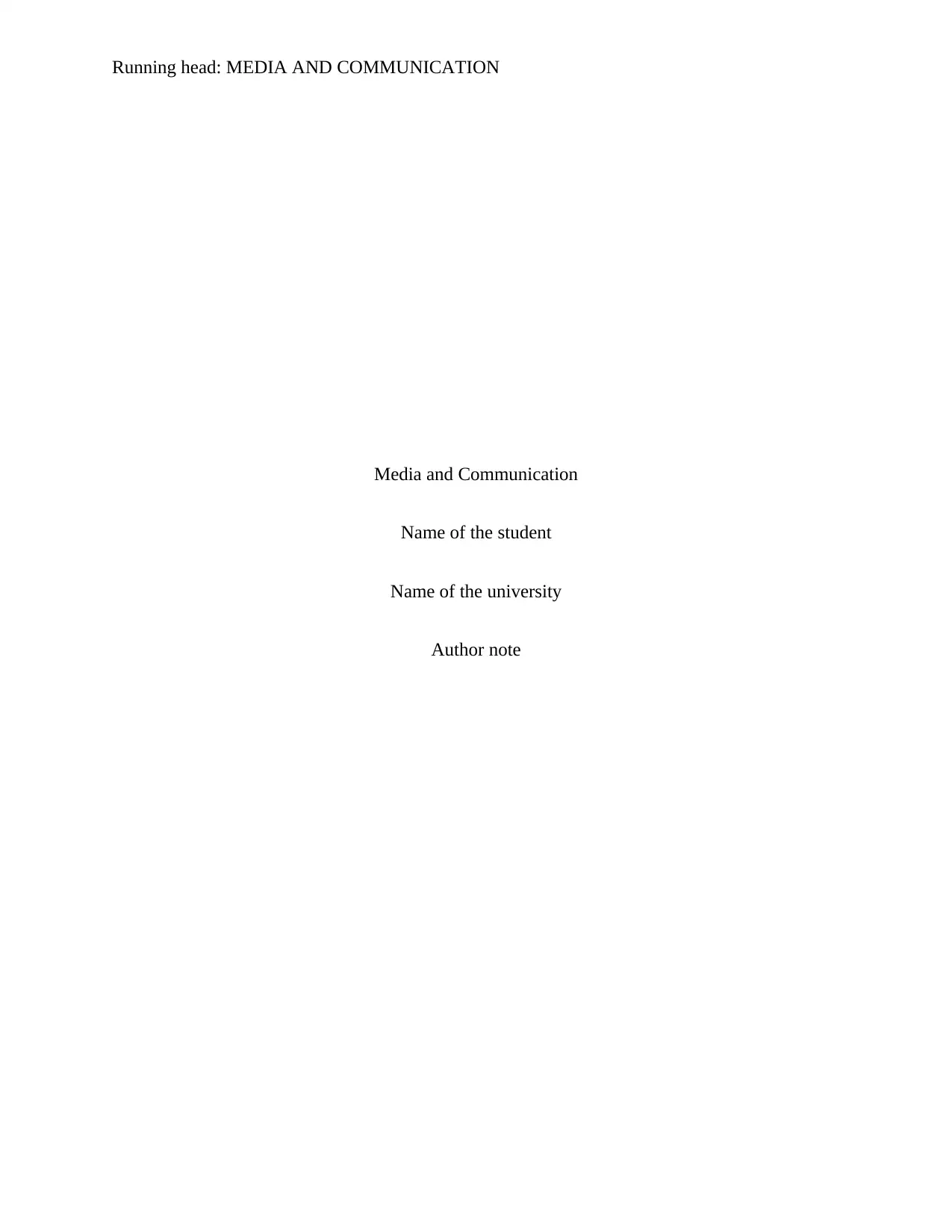
Running head: MEDIA AND COMMUNICATION
Media and Communication
Name of the student
Name of the university
Author note
Media and Communication
Name of the student
Name of the university
Author note
Paraphrase This Document
Need a fresh take? Get an instant paraphrase of this document with our AI Paraphraser
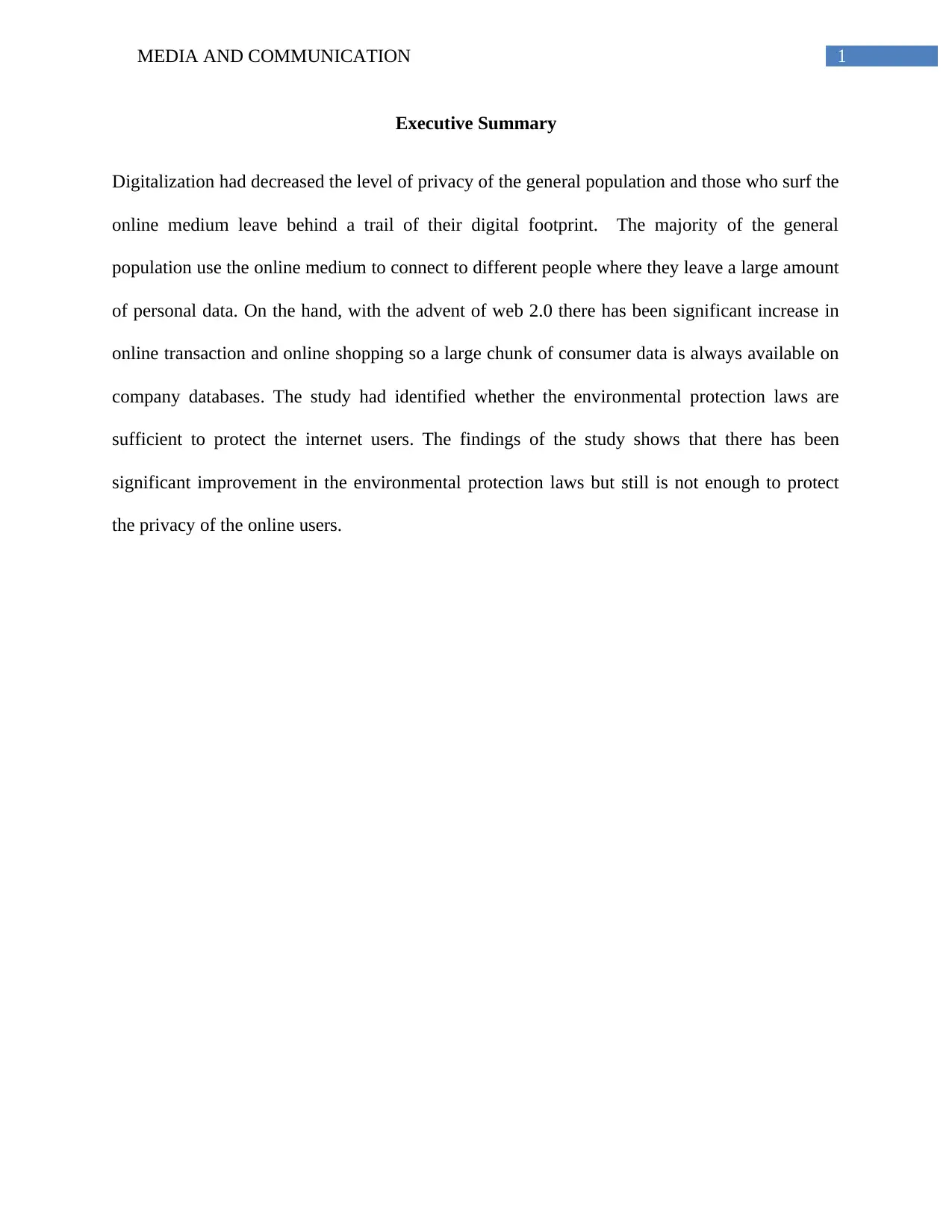
1MEDIA AND COMMUNICATION
Executive Summary
Digitalization had decreased the level of privacy of the general population and those who surf the
online medium leave behind a trail of their digital footprint. The majority of the general
population use the online medium to connect to different people where they leave a large amount
of personal data. On the hand, with the advent of web 2.0 there has been significant increase in
online transaction and online shopping so a large chunk of consumer data is always available on
company databases. The study had identified whether the environmental protection laws are
sufficient to protect the internet users. The findings of the study shows that there has been
significant improvement in the environmental protection laws but still is not enough to protect
the privacy of the online users.
Executive Summary
Digitalization had decreased the level of privacy of the general population and those who surf the
online medium leave behind a trail of their digital footprint. The majority of the general
population use the online medium to connect to different people where they leave a large amount
of personal data. On the hand, with the advent of web 2.0 there has been significant increase in
online transaction and online shopping so a large chunk of consumer data is always available on
company databases. The study had identified whether the environmental protection laws are
sufficient to protect the internet users. The findings of the study shows that there has been
significant improvement in the environmental protection laws but still is not enough to protect
the privacy of the online users.
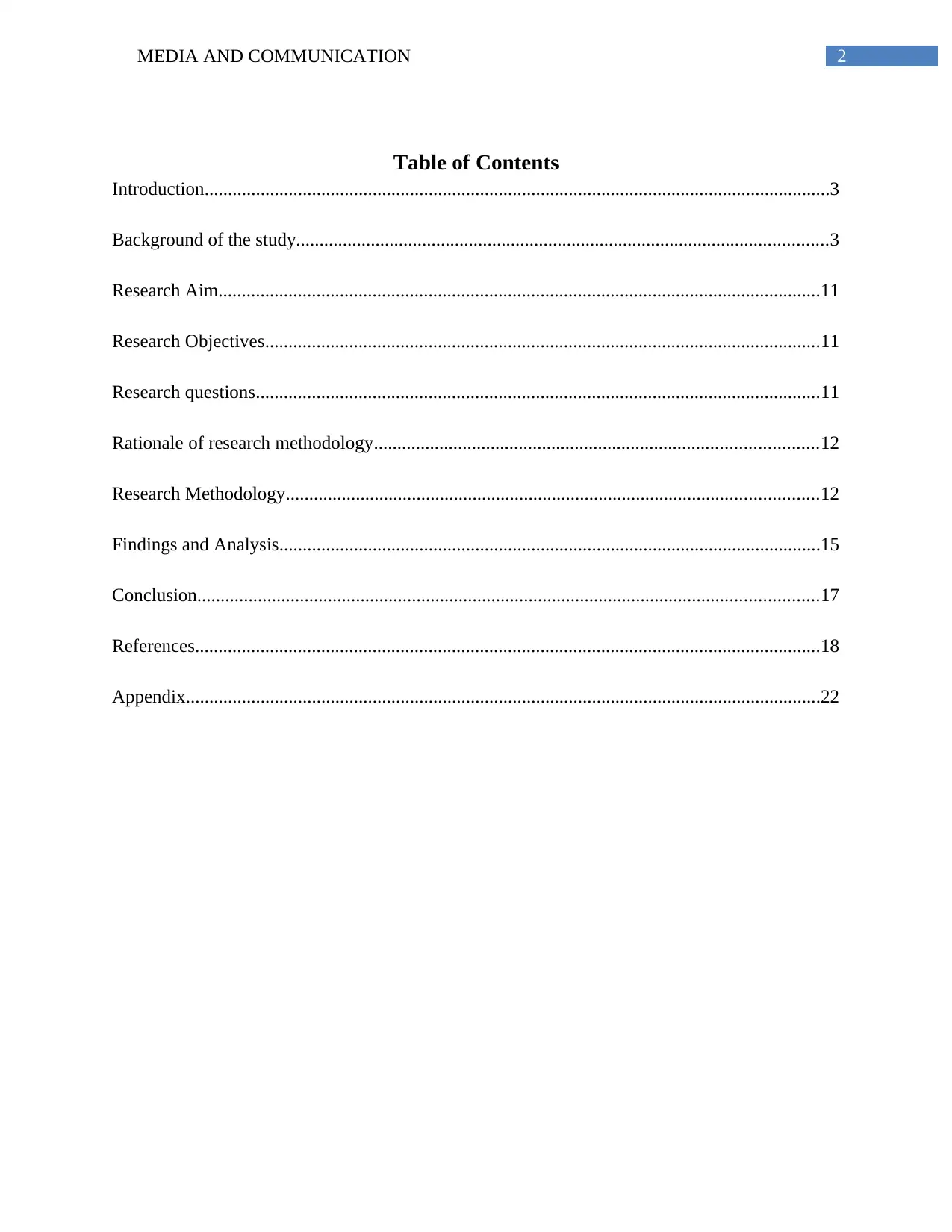
2MEDIA AND COMMUNICATION
Table of Contents
Introduction......................................................................................................................................3
Background of the study..................................................................................................................3
Research Aim.................................................................................................................................11
Research Objectives.......................................................................................................................11
Research questions.........................................................................................................................11
Rationale of research methodology...............................................................................................12
Research Methodology..................................................................................................................12
Findings and Analysis....................................................................................................................15
Conclusion.....................................................................................................................................17
References......................................................................................................................................18
Appendix........................................................................................................................................22
Table of Contents
Introduction......................................................................................................................................3
Background of the study..................................................................................................................3
Research Aim.................................................................................................................................11
Research Objectives.......................................................................................................................11
Research questions.........................................................................................................................11
Rationale of research methodology...............................................................................................12
Research Methodology..................................................................................................................12
Findings and Analysis....................................................................................................................15
Conclusion.....................................................................................................................................17
References......................................................................................................................................18
Appendix........................................................................................................................................22
⊘ This is a preview!⊘
Do you want full access?
Subscribe today to unlock all pages.

Trusted by 1+ million students worldwide
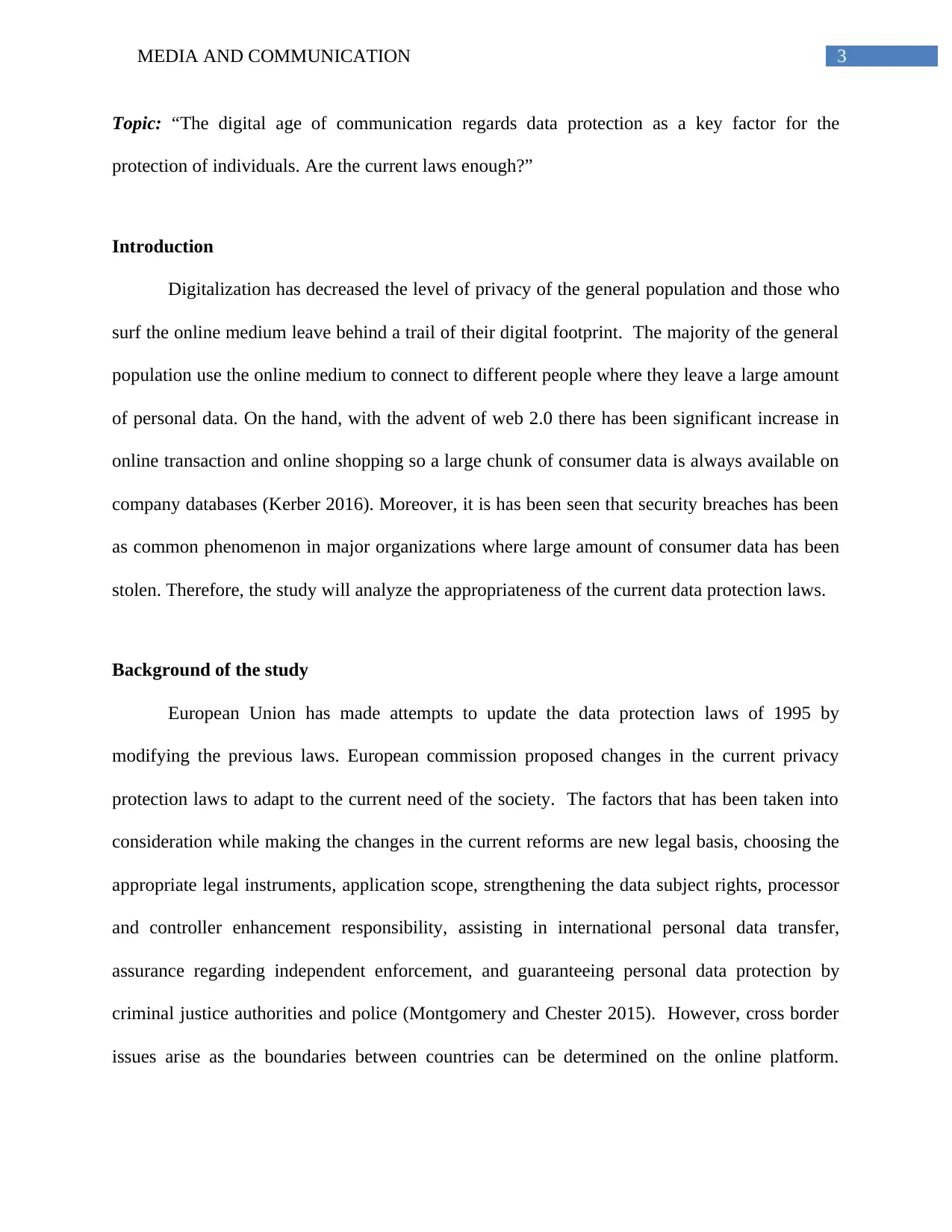
3MEDIA AND COMMUNICATION
Topic: “The digital age of communication regards data protection as a key factor for the
protection of individuals. Are the current laws enough?”
Introduction
Digitalization has decreased the level of privacy of the general population and those who
surf the online medium leave behind a trail of their digital footprint. The majority of the general
population use the online medium to connect to different people where they leave a large amount
of personal data. On the hand, with the advent of web 2.0 there has been significant increase in
online transaction and online shopping so a large chunk of consumer data is always available on
company databases (Kerber 2016). Moreover, it is has been seen that security breaches has been
as common phenomenon in major organizations where large amount of consumer data has been
stolen. Therefore, the study will analyze the appropriateness of the current data protection laws.
Background of the study
European Union has made attempts to update the data protection laws of 1995 by
modifying the previous laws. European commission proposed changes in the current privacy
protection laws to adapt to the current need of the society. The factors that has been taken into
consideration while making the changes in the current reforms are new legal basis, choosing the
appropriate legal instruments, application scope, strengthening the data subject rights, processor
and controller enhancement responsibility, assisting in international personal data transfer,
assurance regarding independent enforcement, and guaranteeing personal data protection by
criminal justice authorities and police (Montgomery and Chester 2015). However, cross border
issues arise as the boundaries between countries can be determined on the online platform.
Topic: “The digital age of communication regards data protection as a key factor for the
protection of individuals. Are the current laws enough?”
Introduction
Digitalization has decreased the level of privacy of the general population and those who
surf the online medium leave behind a trail of their digital footprint. The majority of the general
population use the online medium to connect to different people where they leave a large amount
of personal data. On the hand, with the advent of web 2.0 there has been significant increase in
online transaction and online shopping so a large chunk of consumer data is always available on
company databases (Kerber 2016). Moreover, it is has been seen that security breaches has been
as common phenomenon in major organizations where large amount of consumer data has been
stolen. Therefore, the study will analyze the appropriateness of the current data protection laws.
Background of the study
European Union has made attempts to update the data protection laws of 1995 by
modifying the previous laws. European commission proposed changes in the current privacy
protection laws to adapt to the current need of the society. The factors that has been taken into
consideration while making the changes in the current reforms are new legal basis, choosing the
appropriate legal instruments, application scope, strengthening the data subject rights, processor
and controller enhancement responsibility, assisting in international personal data transfer,
assurance regarding independent enforcement, and guaranteeing personal data protection by
criminal justice authorities and police (Montgomery and Chester 2015). However, cross border
issues arise as the boundaries between countries can be determined on the online platform.
Paraphrase This Document
Need a fresh take? Get an instant paraphrase of this document with our AI Paraphraser
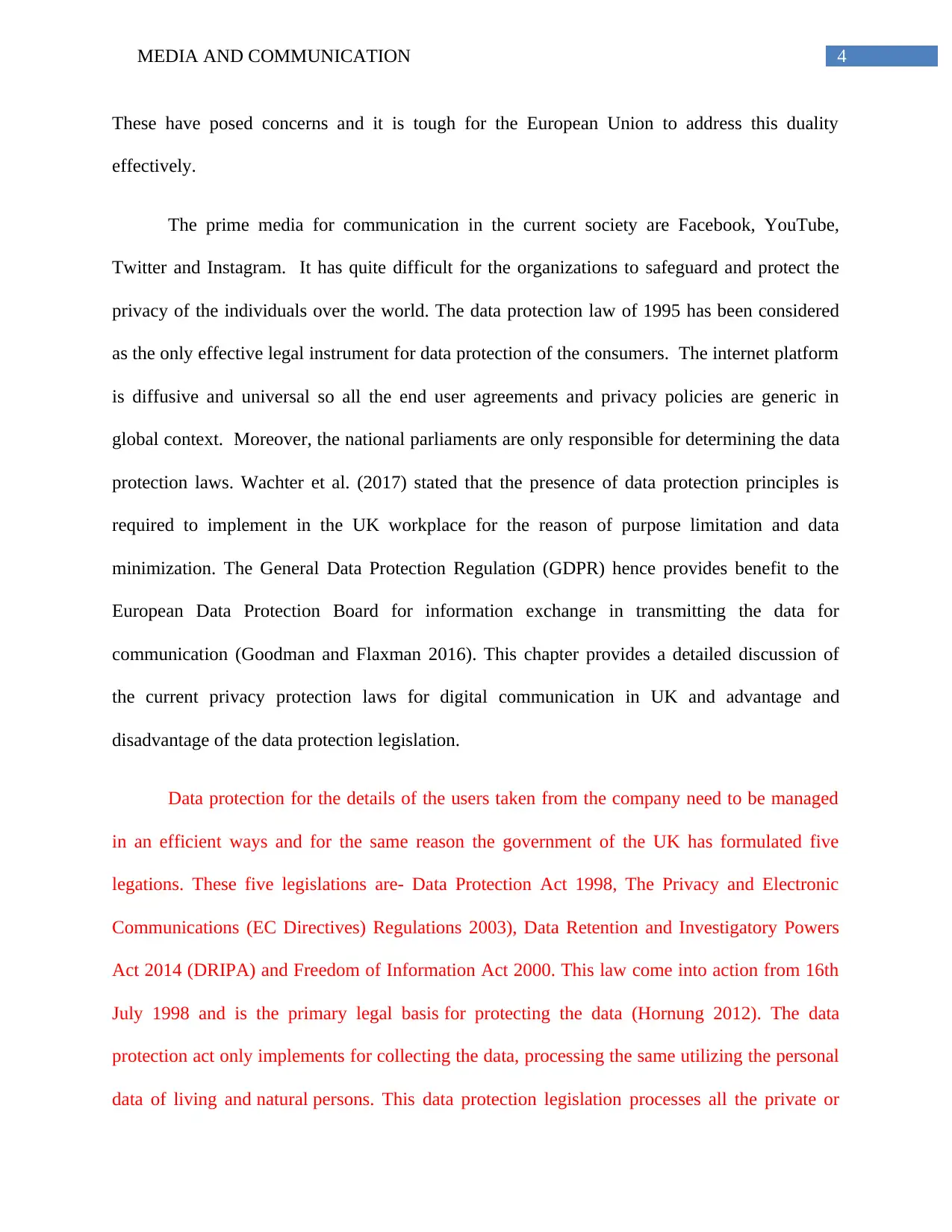
4MEDIA AND COMMUNICATION
These have posed concerns and it is tough for the European Union to address this duality
effectively.
The prime media for communication in the current society are Facebook, YouTube,
Twitter and Instagram. It has quite difficult for the organizations to safeguard and protect the
privacy of the individuals over the world. The data protection law of 1995 has been considered
as the only effective legal instrument for data protection of the consumers. The internet platform
is diffusive and universal so all the end user agreements and privacy policies are generic in
global context. Moreover, the national parliaments are only responsible for determining the data
protection laws. Wachter et al. (2017) stated that the presence of data protection principles is
required to implement in the UK workplace for the reason of purpose limitation and data
minimization. The General Data Protection Regulation (GDPR) hence provides benefit to the
European Data Protection Board for information exchange in transmitting the data for
communication (Goodman and Flaxman 2016). This chapter provides a detailed discussion of
the current privacy protection laws for digital communication in UK and advantage and
disadvantage of the data protection legislation.
Data protection for the details of the users taken from the company need to be managed
in an efficient ways and for the same reason the government of the UK has formulated five
legations. These five legislations are- Data Protection Act 1998, The Privacy and Electronic
Communications (EC Directives) Regulations 2003), Data Retention and Investigatory Powers
Act 2014 (DRIPA) and Freedom of Information Act 2000. This law come into action from 16th
July 1998 and is the primary legal basis for protecting the data (Hornung 2012). The data
protection act only implements for collecting the data, processing the same utilizing the personal
data of living and natural persons. This data protection legislation processes all the private or
These have posed concerns and it is tough for the European Union to address this duality
effectively.
The prime media for communication in the current society are Facebook, YouTube,
Twitter and Instagram. It has quite difficult for the organizations to safeguard and protect the
privacy of the individuals over the world. The data protection law of 1995 has been considered
as the only effective legal instrument for data protection of the consumers. The internet platform
is diffusive and universal so all the end user agreements and privacy policies are generic in
global context. Moreover, the national parliaments are only responsible for determining the data
protection laws. Wachter et al. (2017) stated that the presence of data protection principles is
required to implement in the UK workplace for the reason of purpose limitation and data
minimization. The General Data Protection Regulation (GDPR) hence provides benefit to the
European Data Protection Board for information exchange in transmitting the data for
communication (Goodman and Flaxman 2016). This chapter provides a detailed discussion of
the current privacy protection laws for digital communication in UK and advantage and
disadvantage of the data protection legislation.
Data protection for the details of the users taken from the company need to be managed
in an efficient ways and for the same reason the government of the UK has formulated five
legations. These five legislations are- Data Protection Act 1998, The Privacy and Electronic
Communications (EC Directives) Regulations 2003), Data Retention and Investigatory Powers
Act 2014 (DRIPA) and Freedom of Information Act 2000. This law come into action from 16th
July 1998 and is the primary legal basis for protecting the data (Hornung 2012). The data
protection act only implements for collecting the data, processing the same utilizing the personal
data of living and natural persons. This data protection legislation processes all the private or
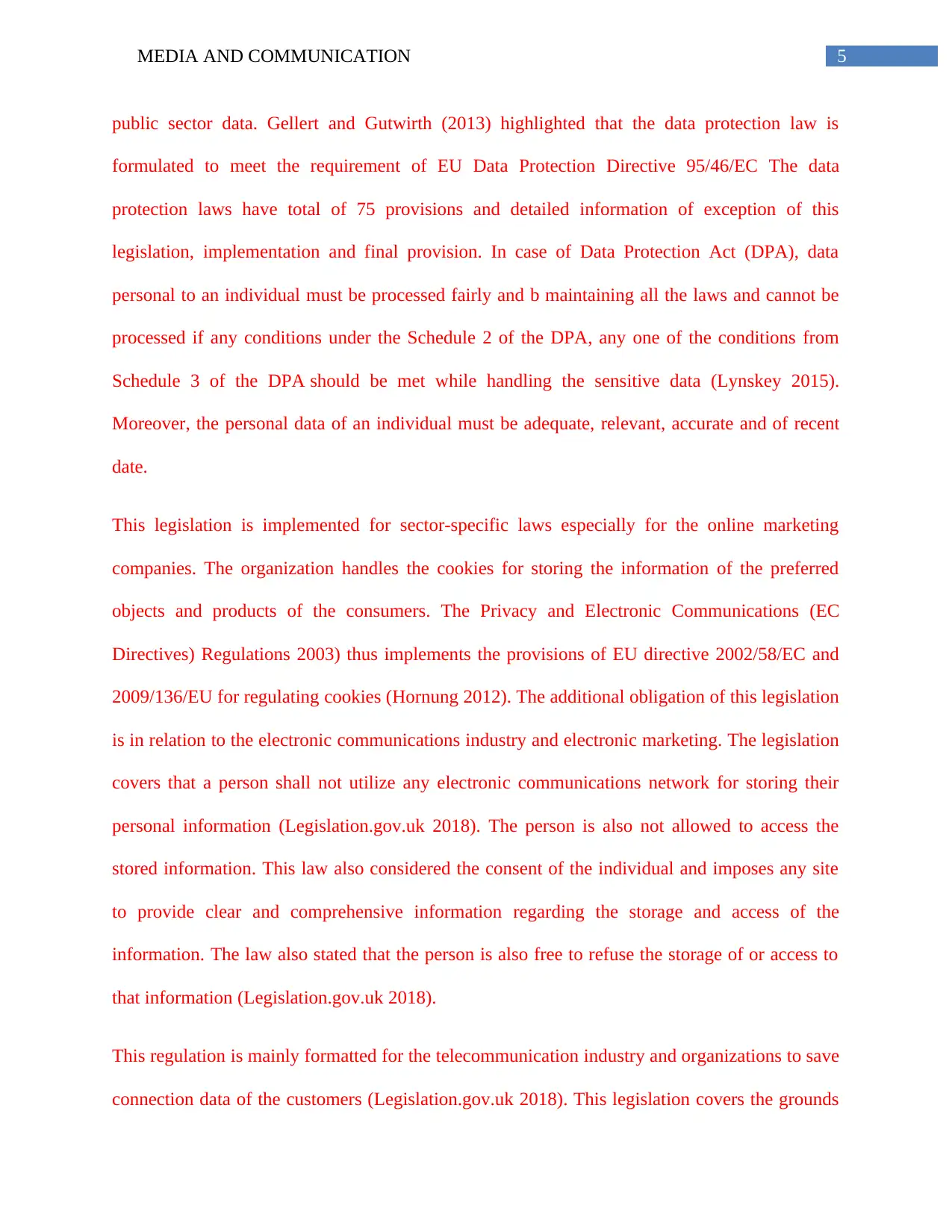
5MEDIA AND COMMUNICATION
public sector data. Gellert and Gutwirth (2013) highlighted that the data protection law is
formulated to meet the requirement of EU Data Protection Directive 95/46/EC The data
protection laws have total of 75 provisions and detailed information of exception of this
legislation, implementation and final provision. In case of Data Protection Act (DPA), data
personal to an individual must be processed fairly and b maintaining all the laws and cannot be
processed if any conditions under the Schedule 2 of the DPA, any one of the conditions from
Schedule 3 of the DPA should be met while handling the sensitive data (Lynskey 2015).
Moreover, the personal data of an individual must be adequate, relevant, accurate and of recent
date.
This legislation is implemented for sector-specific laws especially for the online marketing
companies. The organization handles the cookies for storing the information of the preferred
objects and products of the consumers. The Privacy and Electronic Communications (EC
Directives) Regulations 2003) thus implements the provisions of EU directive 2002/58/EC and
2009/136/EU for regulating cookies (Hornung 2012). The additional obligation of this legislation
is in relation to the electronic communications industry and electronic marketing. The legislation
covers that a person shall not utilize any electronic communications network for storing their
personal information (Legislation.gov.uk 2018). The person is also not allowed to access the
stored information. This law also considered the consent of the individual and imposes any site
to provide clear and comprehensive information regarding the storage and access of the
information. The law also stated that the person is also free to refuse the storage of or access to
that information (Legislation.gov.uk 2018).
This regulation is mainly formatted for the telecommunication industry and organizations to save
connection data of the customers (Legislation.gov.uk 2018). This legislation covers the grounds
public sector data. Gellert and Gutwirth (2013) highlighted that the data protection law is
formulated to meet the requirement of EU Data Protection Directive 95/46/EC The data
protection laws have total of 75 provisions and detailed information of exception of this
legislation, implementation and final provision. In case of Data Protection Act (DPA), data
personal to an individual must be processed fairly and b maintaining all the laws and cannot be
processed if any conditions under the Schedule 2 of the DPA, any one of the conditions from
Schedule 3 of the DPA should be met while handling the sensitive data (Lynskey 2015).
Moreover, the personal data of an individual must be adequate, relevant, accurate and of recent
date.
This legislation is implemented for sector-specific laws especially for the online marketing
companies. The organization handles the cookies for storing the information of the preferred
objects and products of the consumers. The Privacy and Electronic Communications (EC
Directives) Regulations 2003) thus implements the provisions of EU directive 2002/58/EC and
2009/136/EU for regulating cookies (Hornung 2012). The additional obligation of this legislation
is in relation to the electronic communications industry and electronic marketing. The legislation
covers that a person shall not utilize any electronic communications network for storing their
personal information (Legislation.gov.uk 2018). The person is also not allowed to access the
stored information. This law also considered the consent of the individual and imposes any site
to provide clear and comprehensive information regarding the storage and access of the
information. The law also stated that the person is also free to refuse the storage of or access to
that information (Legislation.gov.uk 2018).
This regulation is mainly formatted for the telecommunication industry and organizations to save
connection data of the customers (Legislation.gov.uk 2018). This legislation covers the grounds
⊘ This is a preview!⊘
Do you want full access?
Subscribe today to unlock all pages.

Trusted by 1+ million students worldwide
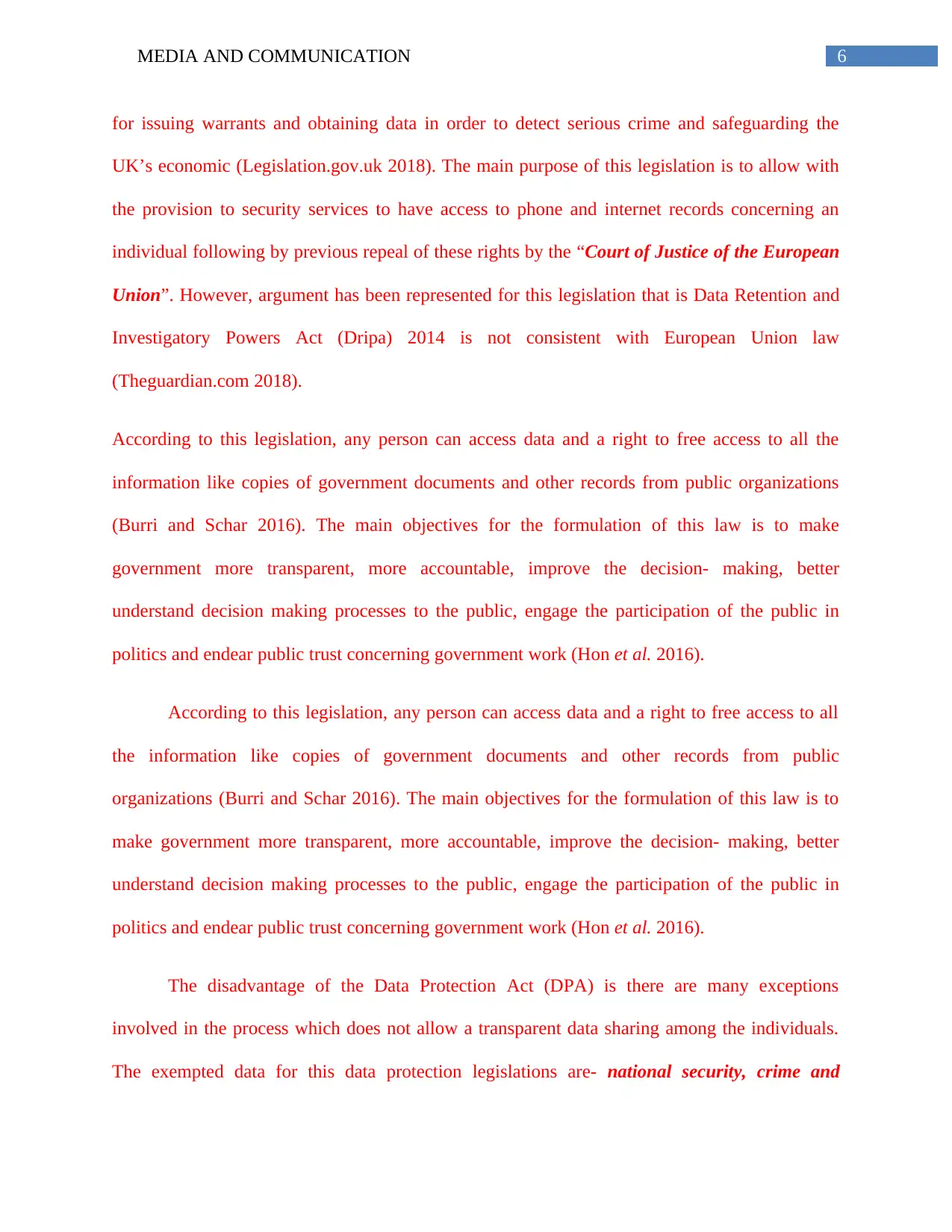
6MEDIA AND COMMUNICATION
for issuing warrants and obtaining data in order to detect serious crime and safeguarding the
UK’s economic (Legislation.gov.uk 2018). The main purpose of this legislation is to allow with
the provision to security services to have access to phone and internet records concerning an
individual following by previous repeal of these rights by the “Court of Justice of the European
Union”. However, argument has been represented for this legislation that is Data Retention and
Investigatory Powers Act (Dripa) 2014 is not consistent with European Union law
(Theguardian.com 2018).
According to this legislation, any person can access data and a right to free access to all the
information like copies of government documents and other records from public organizations
(Burri and Schar 2016). The main objectives for the formulation of this law is to make
government more transparent, more accountable, improve the decision- making, better
understand decision making processes to the public, engage the participation of the public in
politics and endear public trust concerning government work (Hon et al. 2016).
According to this legislation, any person can access data and a right to free access to all
the information like copies of government documents and other records from public
organizations (Burri and Schar 2016). The main objectives for the formulation of this law is to
make government more transparent, more accountable, improve the decision- making, better
understand decision making processes to the public, engage the participation of the public in
politics and endear public trust concerning government work (Hon et al. 2016).
The disadvantage of the Data Protection Act (DPA) is there are many exceptions
involved in the process which does not allow a transparent data sharing among the individuals.
The exempted data for this data protection legislations are- national security, crime and
for issuing warrants and obtaining data in order to detect serious crime and safeguarding the
UK’s economic (Legislation.gov.uk 2018). The main purpose of this legislation is to allow with
the provision to security services to have access to phone and internet records concerning an
individual following by previous repeal of these rights by the “Court of Justice of the European
Union”. However, argument has been represented for this legislation that is Data Retention and
Investigatory Powers Act (Dripa) 2014 is not consistent with European Union law
(Theguardian.com 2018).
According to this legislation, any person can access data and a right to free access to all the
information like copies of government documents and other records from public organizations
(Burri and Schar 2016). The main objectives for the formulation of this law is to make
government more transparent, more accountable, improve the decision- making, better
understand decision making processes to the public, engage the participation of the public in
politics and endear public trust concerning government work (Hon et al. 2016).
According to this legislation, any person can access data and a right to free access to all
the information like copies of government documents and other records from public
organizations (Burri and Schar 2016). The main objectives for the formulation of this law is to
make government more transparent, more accountable, improve the decision- making, better
understand decision making processes to the public, engage the participation of the public in
politics and endear public trust concerning government work (Hon et al. 2016).
The disadvantage of the Data Protection Act (DPA) is there are many exceptions
involved in the process which does not allow a transparent data sharing among the individuals.
The exempted data for this data protection legislations are- national security, crime and
Paraphrase This Document
Need a fresh take? Get an instant paraphrase of this document with our AI Paraphraser
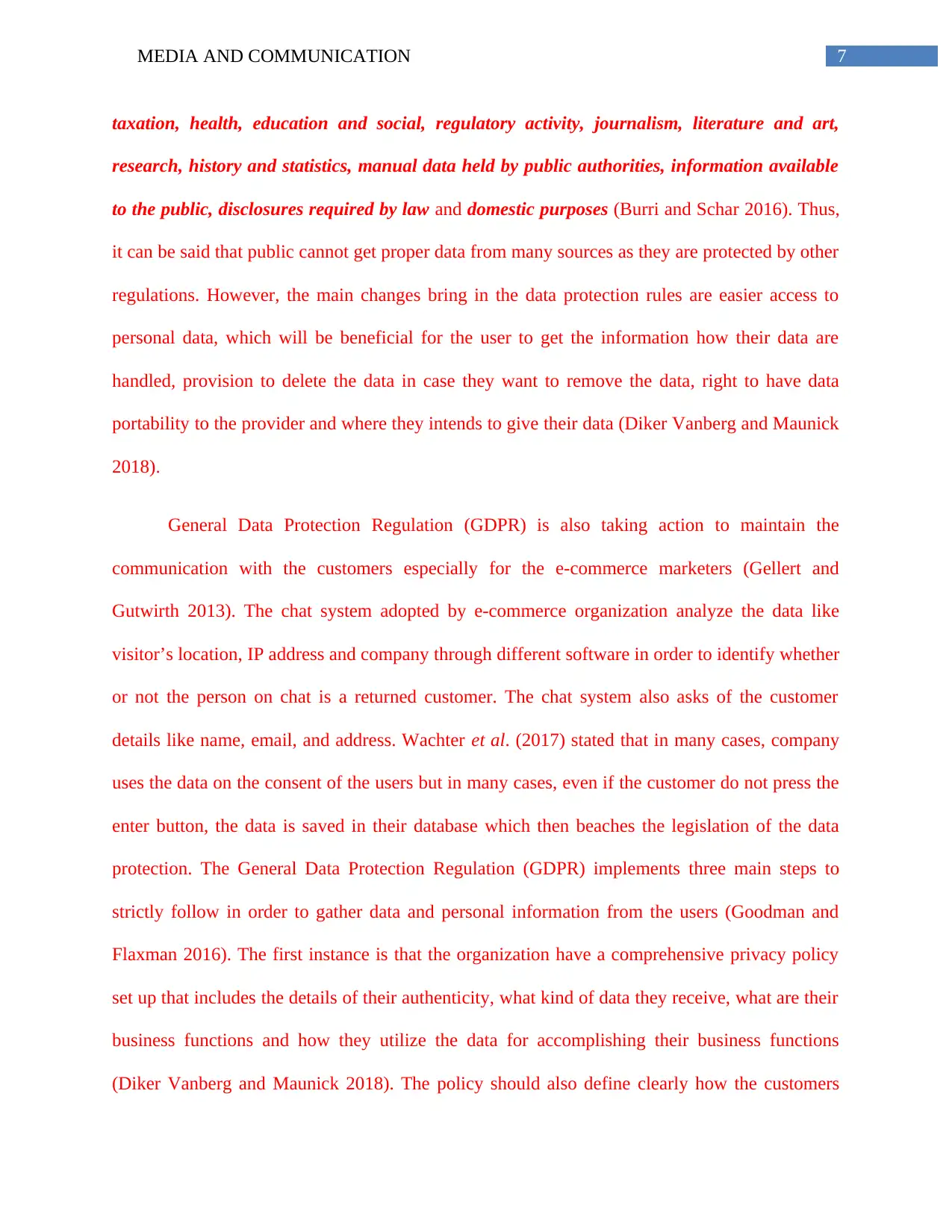
7MEDIA AND COMMUNICATION
taxation, health, education and social, regulatory activity, journalism, literature and art,
research, history and statistics, manual data held by public authorities, information available
to the public, disclosures required by law and domestic purposes (Burri and Schar 2016). Thus,
it can be said that public cannot get proper data from many sources as they are protected by other
regulations. However, the main changes bring in the data protection rules are easier access to
personal data, which will be beneficial for the user to get the information how their data are
handled, provision to delete the data in case they want to remove the data, right to have data
portability to the provider and where they intends to give their data (Diker Vanberg and Maunick
2018).
General Data Protection Regulation (GDPR) is also taking action to maintain the
communication with the customers especially for the e-commerce marketers (Gellert and
Gutwirth 2013). The chat system adopted by e-commerce organization analyze the data like
visitor’s location, IP address and company through different software in order to identify whether
or not the person on chat is a returned customer. The chat system also asks of the customer
details like name, email, and address. Wachter et al. (2017) stated that in many cases, company
uses the data on the consent of the users but in many cases, even if the customer do not press the
enter button, the data is saved in their database which then beaches the legislation of the data
protection. The General Data Protection Regulation (GDPR) implements three main steps to
strictly follow in order to gather data and personal information from the users (Goodman and
Flaxman 2016). The first instance is that the organization have a comprehensive privacy policy
set up that includes the details of their authenticity, what kind of data they receive, what are their
business functions and how they utilize the data for accomplishing their business functions
(Diker Vanberg and Maunick 2018). The policy should also define clearly how the customers
taxation, health, education and social, regulatory activity, journalism, literature and art,
research, history and statistics, manual data held by public authorities, information available
to the public, disclosures required by law and domestic purposes (Burri and Schar 2016). Thus,
it can be said that public cannot get proper data from many sources as they are protected by other
regulations. However, the main changes bring in the data protection rules are easier access to
personal data, which will be beneficial for the user to get the information how their data are
handled, provision to delete the data in case they want to remove the data, right to have data
portability to the provider and where they intends to give their data (Diker Vanberg and Maunick
2018).
General Data Protection Regulation (GDPR) is also taking action to maintain the
communication with the customers especially for the e-commerce marketers (Gellert and
Gutwirth 2013). The chat system adopted by e-commerce organization analyze the data like
visitor’s location, IP address and company through different software in order to identify whether
or not the person on chat is a returned customer. The chat system also asks of the customer
details like name, email, and address. Wachter et al. (2017) stated that in many cases, company
uses the data on the consent of the users but in many cases, even if the customer do not press the
enter button, the data is saved in their database which then beaches the legislation of the data
protection. The General Data Protection Regulation (GDPR) implements three main steps to
strictly follow in order to gather data and personal information from the users (Goodman and
Flaxman 2016). The first instance is that the organization have a comprehensive privacy policy
set up that includes the details of their authenticity, what kind of data they receive, what are their
business functions and how they utilize the data for accomplishing their business functions
(Diker Vanberg and Maunick 2018). The policy should also define clearly how the customers
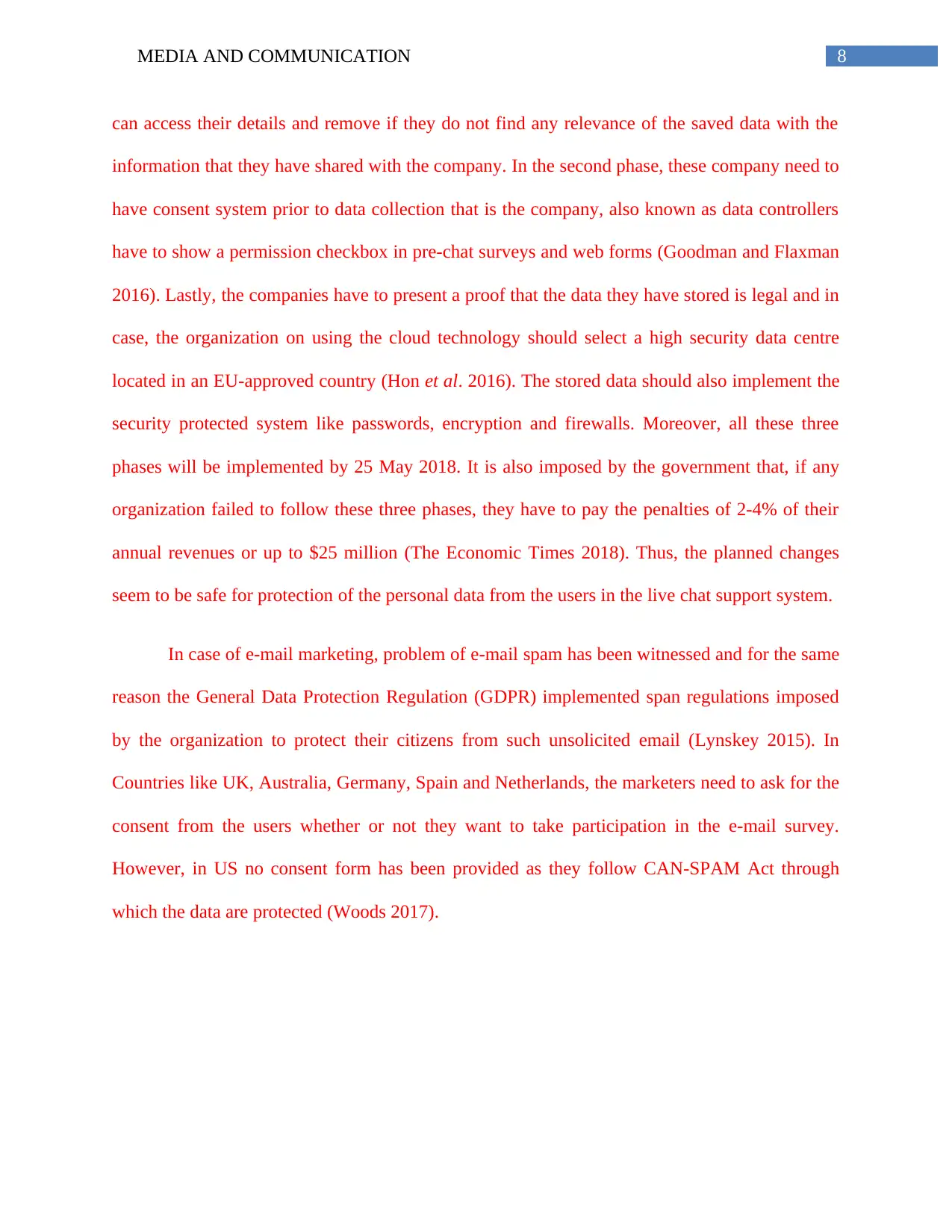
8MEDIA AND COMMUNICATION
can access their details and remove if they do not find any relevance of the saved data with the
information that they have shared with the company. In the second phase, these company need to
have consent system prior to data collection that is the company, also known as data controllers
have to show a permission checkbox in pre-chat surveys and web forms (Goodman and Flaxman
2016). Lastly, the companies have to present a proof that the data they have stored is legal and in
case, the organization on using the cloud technology should select a high security data centre
located in an EU-approved country (Hon et al. 2016). The stored data should also implement the
security protected system like passwords, encryption and firewalls. Moreover, all these three
phases will be implemented by 25 May 2018. It is also imposed by the government that, if any
organization failed to follow these three phases, they have to pay the penalties of 2-4% of their
annual revenues or up to $25 million (The Economic Times 2018). Thus, the planned changes
seem to be safe for protection of the personal data from the users in the live chat support system.
In case of e-mail marketing, problem of e-mail spam has been witnessed and for the same
reason the General Data Protection Regulation (GDPR) implemented span regulations imposed
by the organization to protect their citizens from such unsolicited email (Lynskey 2015). In
Countries like UK, Australia, Germany, Spain and Netherlands, the marketers need to ask for the
consent from the users whether or not they want to take participation in the e-mail survey.
However, in US no consent form has been provided as they follow CAN-SPAM Act through
which the data are protected (Woods 2017).
can access their details and remove if they do not find any relevance of the saved data with the
information that they have shared with the company. In the second phase, these company need to
have consent system prior to data collection that is the company, also known as data controllers
have to show a permission checkbox in pre-chat surveys and web forms (Goodman and Flaxman
2016). Lastly, the companies have to present a proof that the data they have stored is legal and in
case, the organization on using the cloud technology should select a high security data centre
located in an EU-approved country (Hon et al. 2016). The stored data should also implement the
security protected system like passwords, encryption and firewalls. Moreover, all these three
phases will be implemented by 25 May 2018. It is also imposed by the government that, if any
organization failed to follow these three phases, they have to pay the penalties of 2-4% of their
annual revenues or up to $25 million (The Economic Times 2018). Thus, the planned changes
seem to be safe for protection of the personal data from the users in the live chat support system.
In case of e-mail marketing, problem of e-mail spam has been witnessed and for the same
reason the General Data Protection Regulation (GDPR) implemented span regulations imposed
by the organization to protect their citizens from such unsolicited email (Lynskey 2015). In
Countries like UK, Australia, Germany, Spain and Netherlands, the marketers need to ask for the
consent from the users whether or not they want to take participation in the e-mail survey.
However, in US no consent form has been provided as they follow CAN-SPAM Act through
which the data are protected (Woods 2017).
⊘ This is a preview!⊘
Do you want full access?
Subscribe today to unlock all pages.

Trusted by 1+ million students worldwide
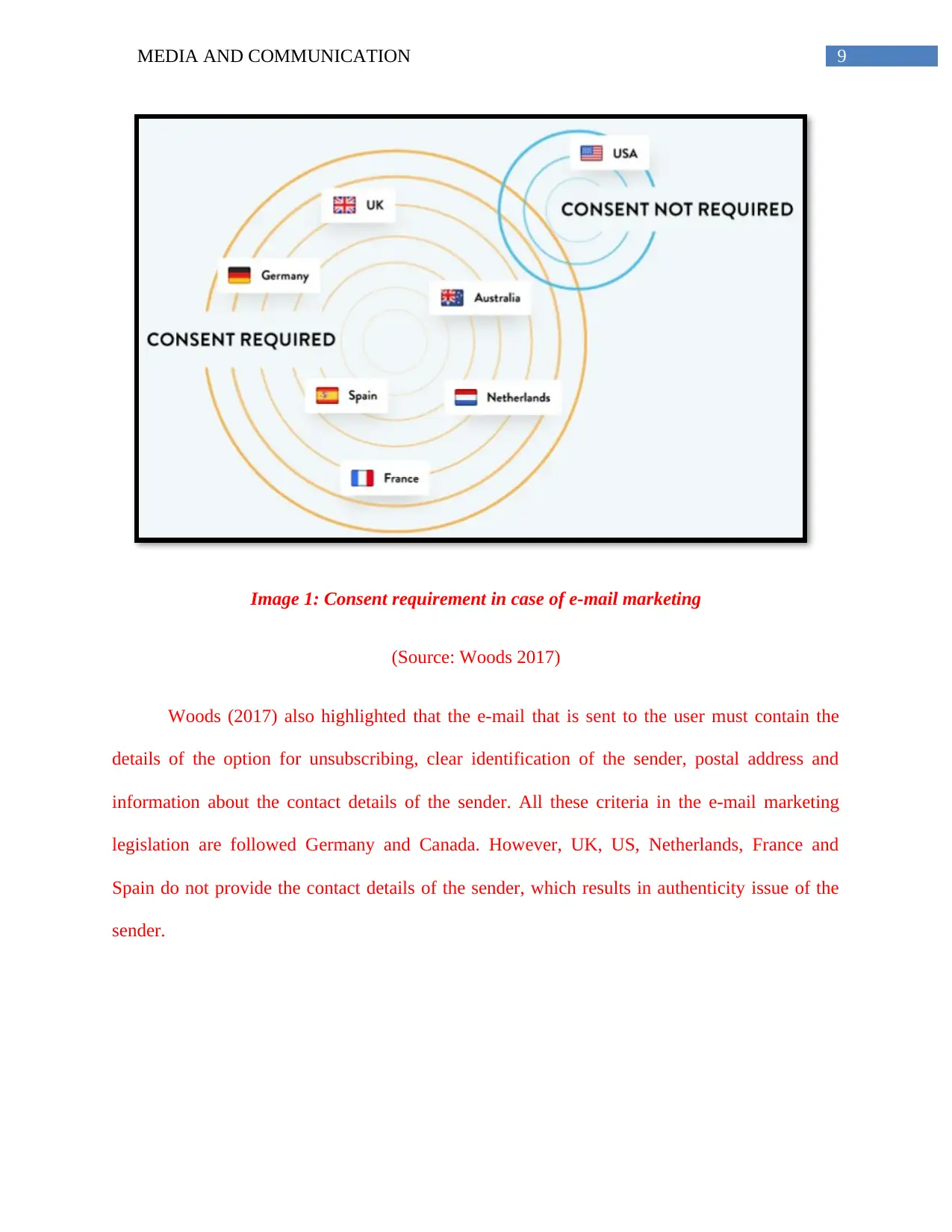
9MEDIA AND COMMUNICATION
Image 1: Consent requirement in case of e-mail marketing
(Source: Woods 2017)
Woods (2017) also highlighted that the e-mail that is sent to the user must contain the
details of the option for unsubscribing, clear identification of the sender, postal address and
information about the contact details of the sender. All these criteria in the e-mail marketing
legislation are followed Germany and Canada. However, UK, US, Netherlands, France and
Spain do not provide the contact details of the sender, which results in authenticity issue of the
sender.
Image 1: Consent requirement in case of e-mail marketing
(Source: Woods 2017)
Woods (2017) also highlighted that the e-mail that is sent to the user must contain the
details of the option for unsubscribing, clear identification of the sender, postal address and
information about the contact details of the sender. All these criteria in the e-mail marketing
legislation are followed Germany and Canada. However, UK, US, Netherlands, France and
Spain do not provide the contact details of the sender, which results in authenticity issue of the
sender.
Paraphrase This Document
Need a fresh take? Get an instant paraphrase of this document with our AI Paraphraser
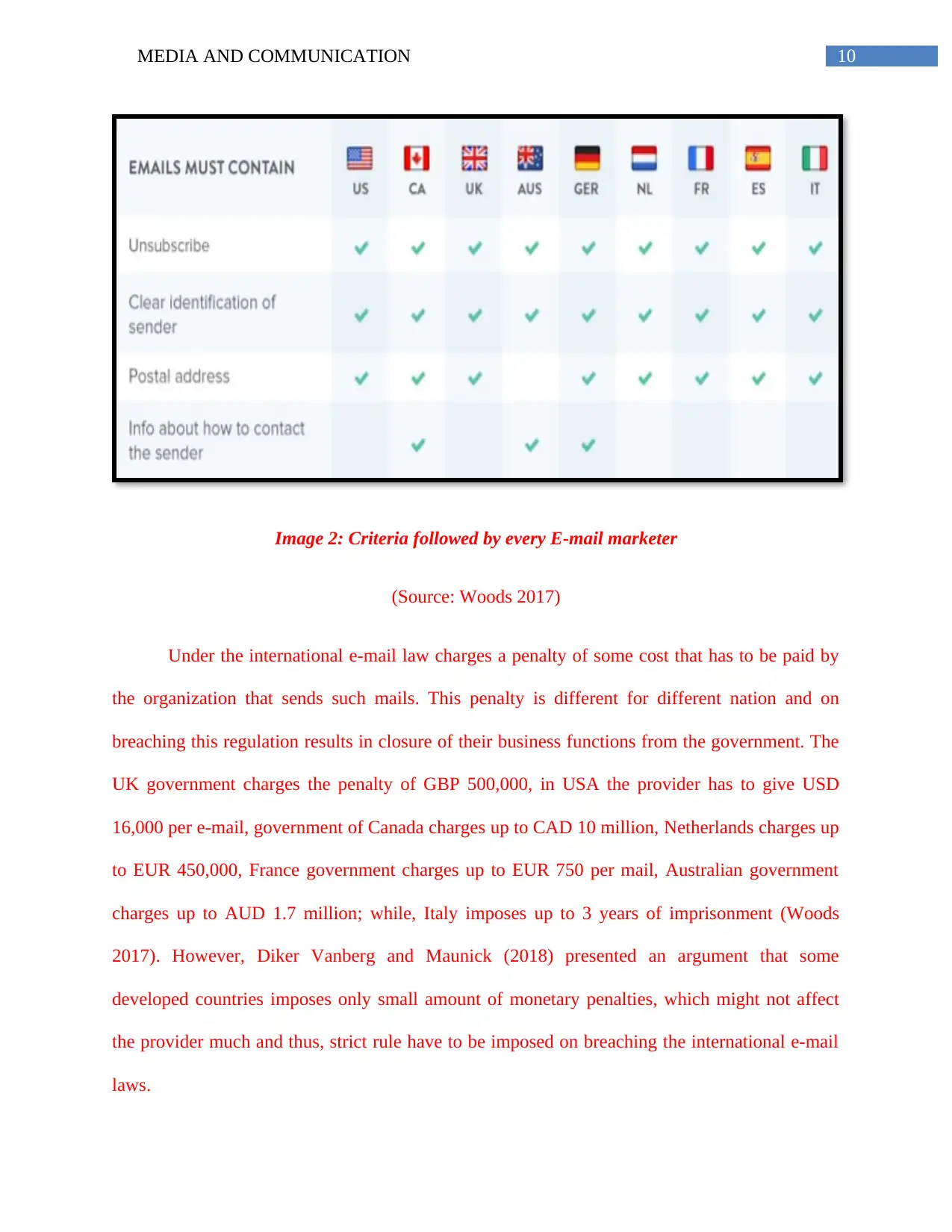
10MEDIA AND COMMUNICATION
Image 2: Criteria followed by every E-mail marketer
(Source: Woods 2017)
Under the international e-mail law charges a penalty of some cost that has to be paid by
the organization that sends such mails. This penalty is different for different nation and on
breaching this regulation results in closure of their business functions from the government. The
UK government charges the penalty of GBP 500,000, in USA the provider has to give USD
16,000 per e-mail, government of Canada charges up to CAD 10 million, Netherlands charges up
to EUR 450,000, France government charges up to EUR 750 per mail, Australian government
charges up to AUD 1.7 million; while, Italy imposes up to 3 years of imprisonment (Woods
2017). However, Diker Vanberg and Maunick (2018) presented an argument that some
developed countries imposes only small amount of monetary penalties, which might not affect
the provider much and thus, strict rule have to be imposed on breaching the international e-mail
laws.
Image 2: Criteria followed by every E-mail marketer
(Source: Woods 2017)
Under the international e-mail law charges a penalty of some cost that has to be paid by
the organization that sends such mails. This penalty is different for different nation and on
breaching this regulation results in closure of their business functions from the government. The
UK government charges the penalty of GBP 500,000, in USA the provider has to give USD
16,000 per e-mail, government of Canada charges up to CAD 10 million, Netherlands charges up
to EUR 450,000, France government charges up to EUR 750 per mail, Australian government
charges up to AUD 1.7 million; while, Italy imposes up to 3 years of imprisonment (Woods
2017). However, Diker Vanberg and Maunick (2018) presented an argument that some
developed countries imposes only small amount of monetary penalties, which might not affect
the provider much and thus, strict rule have to be imposed on breaching the international e-mail
laws.
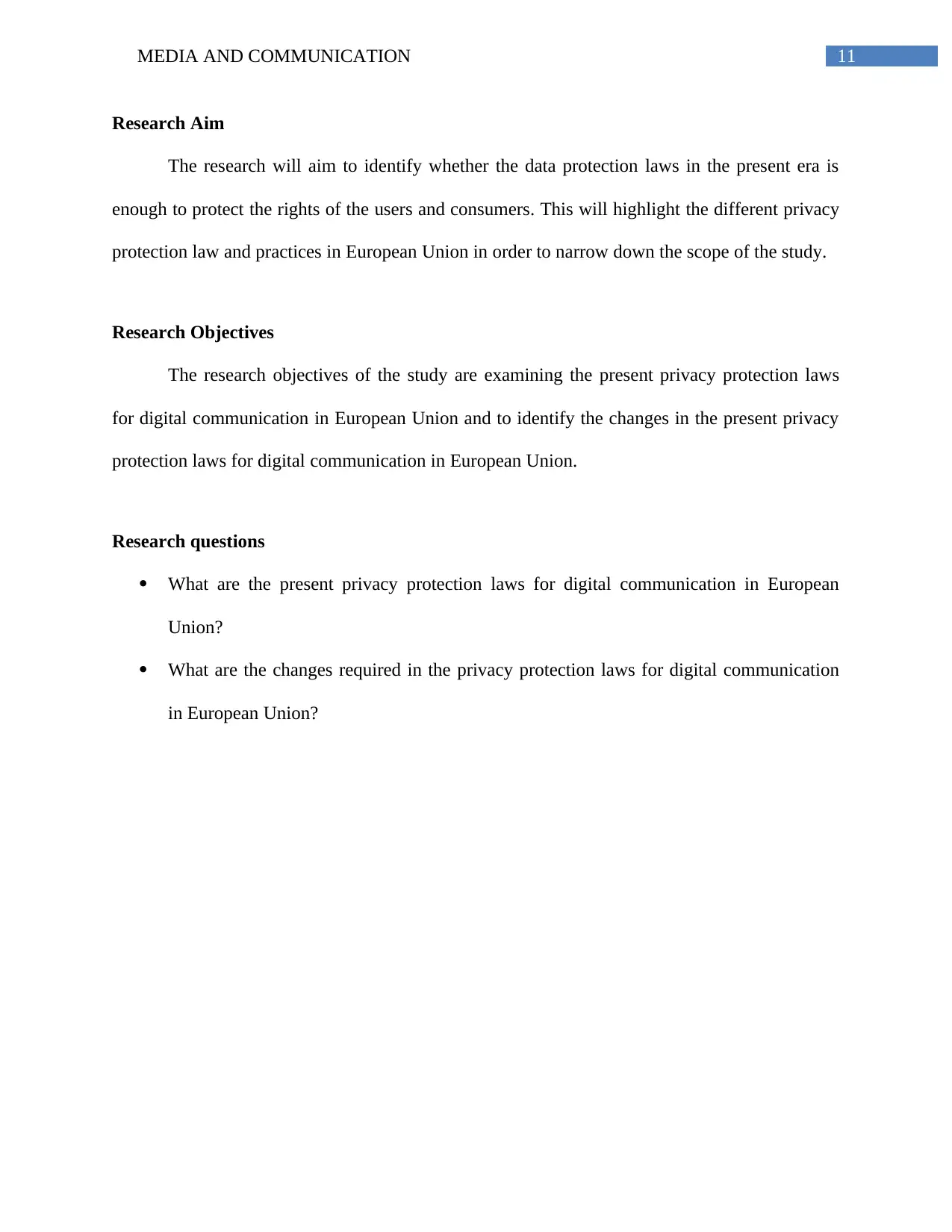
11MEDIA AND COMMUNICATION
Research Aim
The research will aim to identify whether the data protection laws in the present era is
enough to protect the rights of the users and consumers. This will highlight the different privacy
protection law and practices in European Union in order to narrow down the scope of the study.
Research Objectives
The research objectives of the study are examining the present privacy protection laws
for digital communication in European Union and to identify the changes in the present privacy
protection laws for digital communication in European Union.
Research questions
What are the present privacy protection laws for digital communication in European
Union?
What are the changes required in the privacy protection laws for digital communication
in European Union?
Research Aim
The research will aim to identify whether the data protection laws in the present era is
enough to protect the rights of the users and consumers. This will highlight the different privacy
protection law and practices in European Union in order to narrow down the scope of the study.
Research Objectives
The research objectives of the study are examining the present privacy protection laws
for digital communication in European Union and to identify the changes in the present privacy
protection laws for digital communication in European Union.
Research questions
What are the present privacy protection laws for digital communication in European
Union?
What are the changes required in the privacy protection laws for digital communication
in European Union?
⊘ This is a preview!⊘
Do you want full access?
Subscribe today to unlock all pages.

Trusted by 1+ million students worldwide
1 out of 23
Related Documents
Your All-in-One AI-Powered Toolkit for Academic Success.
+13062052269
info@desklib.com
Available 24*7 on WhatsApp / Email
![[object Object]](/_next/static/media/star-bottom.7253800d.svg)
Unlock your academic potential
Copyright © 2020–2026 A2Z Services. All Rights Reserved. Developed and managed by ZUCOL.





